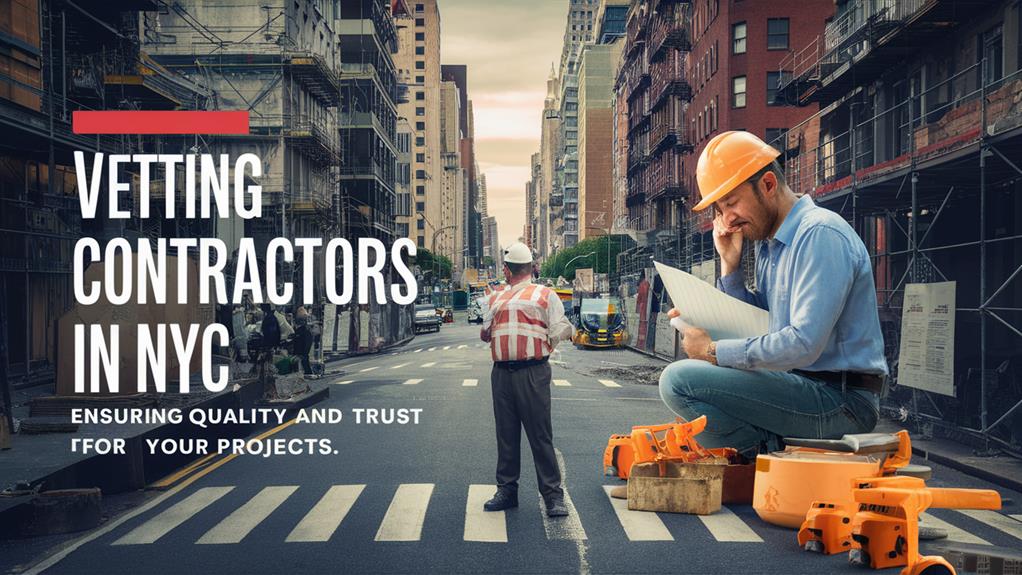Vetting contractors in NYC is essential for several reasons. It protects your investment by ensuring the contractor has valid licenses and meets local building codes. When you hire a licensed professional, you reduce legal and financial risks, avoiding issues related to unqualified workers. Comprehensive checks also help you assess quality, ensuring the project's success. By partnering with reputable contractors, you enhance your project's credibility. Additionally, a thorough vetting process saves you from costly mistakes and delays. Understanding these points can guide you to make informed decisions in contractor selection and project management, leading you to better outcomes.
Importance of Vetting Contractors

Vetting contractors in NYC is crucial for protecting your investment and ensuring a successful project. When you're hiring a general contractor, you want to make sure they comply with local building codes and hold valid licenses. The vetting process helps you avoid unlicensed contractors, who can expose you to legal and financial liabilities.
By conducting thorough background checks, you can uncover issues like expired licenses, which might lead to project delays or legal repercussions. Additionally, partnering with a recognized industry leader like Commercial Contractor New York can enhance your project's credibility and compliance with regulations.
Assessing a contractor's previous work quality through client references and reviews is vital. This helps you gauge their reliability and craftsmanship. Establishing clear hiring criteria ensures you select the right contractors, while regular audits of qualifications can prevent hiring mistakes.
Given that the average lawsuit amounts in NYC property cases have increased, it's more important than ever to vet contractors properly. You want to ensure they've adequate insurance coverage and a solid contractors insurance policy to protect against potential property damage.
Understanding Licensing and Insurance
Navigating the complexities of contractor licensing and insurance in NYC is essential for any homeowner. When hiring a contractor, you need to ensure they've obtained the proper licensing from the Department of Buildings (DOB). This verification is crucial for compliance with local regulations and ensures that you're working with a recognized leader in the industry, known for their commitment to excellence and innovation.
If you hire an unlicensed contractor, any issues that arise during the project could fall back on you, leading to costly legal and financial troubles.
Additionally, contractors must have adequate insurance coverage, including general liability and workers' compensation. This insurance protects you from financial liabilities resulting from accidents or damages that may occur on your property.
It's crucial to ask for proof of this insurance and carefully verify that the documentation is complete, as gaps in coverage can create complications later.
Regular audits of contractor qualifications, including their licensing and insurance status, help maintain compliance with NYC regulations. By taking these steps, you'll not only safeguard your investment but also contribute to a safer project environment.
Always remember that thorough verification of licensing and insurance can save you from unforeseen headaches down the road.
Assessing Liability Risks

Understanding licensing and insurance lays the groundwork for assessing liability risks when hiring contractors in NYC. When you choose to hire, you must consider how vetting contractors can protect you from significant liability risks.
Effective project management is essential in this process, as it ensures that all aspects of the project are handled professionally and efficiently. If a contractor isn't licensed, you could be held liable for damages resulting from their non-compliance with local regulations. Additionally, a lack of proper insurance coverage can lead to financial hardships if accidents occur on construction sites, with claims often reaching upwards of $5 million.
To safeguard yourself, ensure comprehensive contract terms, including indemnification clauses, are in place. These clauses help protect property owners from potential negligence by contractors, ensuring accountability for any mishaps.
Properly vetting contractors not only helps you avoid legal pitfalls but also supports adherence to the Business Judgment Rule, which can protect you from liability for unfavorable job outcomes. By taking the time to assess these factors, you can significantly reduce your exposure to liability risks, making a safer environment for everyone involved.
Ultimately, thorough vetting is crucial for maintaining compliance and ensuring your project runs smoothly without unexpected legal troubles.
Best Practices for Contractor Management
When managing contractors in NYC, it's crucial to establish a systematic approach that ensures compliance and quality throughout the project. Here are some best practices to follow:
- Verify contractor qualifications, ensuring all licenses are active and relevant.
- Conduct thorough background checks on contractors, focusing on previous work quality and insurance coverage.
- Document and verify all insurance requirements, including liability insurance and workers' compensation insurance.
- Schedule routine audits of contractor performance to ensure adherence to project specifications.
These practices help you mitigate risks associated with hiring unqualified individuals.
Regularly updating and reviewing your contractor list prioritizes safety and compliance, which minimizes potential legal repercussions.
You should also keep an eye on contractor performance throughout the project. This ensures consistent quality and adherence to your project specifications.
By implementing these contractor management strategies, you not only protect your investment but also create a more reliable workforce.
Remember that effective management involves ongoing communication and evaluation, so don't hesitate to adjust your approach as needed.
Role of Management in Selection

Effective management is vital in the contractor selection process, as it ensures that due diligence is exercised in vetting potential candidates. You must rely on management's expertise to evaluate contractor qualifications thoroughly. This informed approach directly impacts project outcomes and helps comply with regulations, which is crucial for success.
Management is responsible for establishing clear hiring criteria, ensuring that potential contractors meet specific standards. Regular audits of contractor qualifications can prevent hiring mistakes, reducing legal risks for everyone involved.
While the ultimate decision about hiring lies with the board members, effective management plays a key role in providing comprehensive information to support this decision-making process. Engaging management in contractor selection also fosters accountability and adherence to the Business Judgment Rule.
This rule protects board members from personal liability by ensuring they base decisions on thorough evaluations and sound reasoning. By involving management, you can create a collaborative environment that leads to better contractor choices.
Sourcing and Evaluating Prospective Contractors
After establishing management's role in contractor selection, the focus shifts to sourcing and evaluating potential candidates. This crucial step ensures you find the right fit for your home renovation project. Here are some key actions to consider:
- Narrow down a list of 3-5 qualified professionals based on their experience and service offerings.
- Conduct site visits to assess their professionalism and communication style.
- Request detailed estimates to compare the inclusions and exclusions of each proposal.
- Evaluate past projects and customer references to understand their capabilities and quality of work.
Sourcing contractors isn't just about finding names; it's about ensuring they align with your budget and project needs. Site visits allow you to gauge compatibility and expectations.
Afterward, obtaining detailed estimates typically takes 1-2 weeks but gives you a clearer picture of costs. Utilizing resources like Sweeten can help streamline the process, connecting you with vetted general contractors offering competitive bids.
This thorough vetting process is essential in preventing hiring mistakes that could lead to costly renovations. By focusing on these steps, you'll be better equipped to make informed decisions when selecting the right contractor for your project.
Common Challenges in Contractor Hiring

Hiring a contractor in NYC can feel overwhelming due to the sheer number of options available. You might struggle to find reputable contractors because many lack transparency in pricing and services. This can lead to misunderstandings and unmet expectations, which no one wants during a renovation process.
Contractors must navigate NYC's complex building codes, and if they're unlicensed or uninformed, it can create serious issues like code violations, project delays, or legal troubles.
Another challenge is dealing with unexpected surprises, such as hidden structural problems. Experienced contractors who can adapt to these situations are essential for keeping your project on track. Quality control is also critical—if you hire unqualified contractors, you risk inferior workmanship and costly repairs. That's why thorough vetting contractors is vital.
To avoid these pitfalls, always conduct reference checks and ask about past projects. This can give you insight into their reliability and expertise. Additionally, ensure that contractors comply with regulations like NYC's Lead Testing requirements, which are crucial for safety.
Conclusion
Vetting contractors in NYC isn't just a smart move; it's essential for your project's success. By checking licenses and insurance, you protect yourself from potential risks. While it might seem like a hassle, the truth is that taking these steps saves you time and money in the long run. So, don't skip this important process. By carefully selecting the right contractors, you set your project up for success and ensure a smoother experience overall.


Leave a Reply